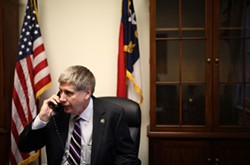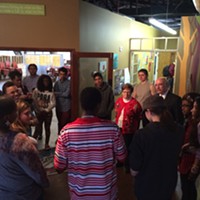Why Larry Kissell may be the political story of 2012
Incumbent U.S. representative must win back disappointed Democrats and calm rancorous Republicans in newly drawn District 8
By Mike CooperBeyond the re-election campaign of America's first black president, the Democratic National Convention coming to Charlotte, and a rematch in the governor's race, the most intriguing political story in 2012 could be a congressional race right in our own backyard. In the 8th congressional district, Democratic Rep. Larry Kissell begins an uphill journey for re-election after redistricting made him vulnerable, while six Republicans enter a primary to vie for the chance to unseat him. The eventual winner will have to unite his party in an election cycle unlike any other.
There is plenty at stake regionally. If President Obama wins North Carolina for the second time, his re-election is practically assured. If the Republicans can hold on to the state legislature, and replace Gov. Bev Perdue with Pat McCrory, they can drastically change the course of state public policy and turn Art Pope's dreams into poor people's nightmares. Yet the real intrigue in the Tar Heel State could come in a handful of congressional elections where redistricting has created uncertainty, endangered Democratic incumbents, and enticed Republican office-seekers.
East Charlotte residents have been accustomed to getting representation in Washington, D.C., from N.C.'s 8th District, the seat Kissell presently holds. That changed when the Republican majority in the General Assembly approved redistricting maps, which moved several neighborhoods, especially African-American ones, from District 8 to District 12, the seat Mel Watt holds. Only a couple of Mecklenburg precincts remain in District 8, which now stretches from Davidson and Rowan counties down to Robeson.
"The new 8th District is much more Republican," said Catawba College political historian Michael Bitzer. "In 2004, this new district would have voted for George W. Bush with 63 percent of the vote. It would have gone to McCain with 57 percent of the vote. So this is going to be an uphill battle for Kissell."
So far, Kissell's vulnerability has lured six candidates who will compete in the GOP primary for the honor of facing him next November: a state representative, a town councilman, a dentist, a doctor, a congressional chief-of-staff, and a notorious far-right perennial candidate.
One of those vying for Kissell's seat is State Rep. Fred Steen, who has represented parts of Rowan in the General Assembly since 2003. His district was drawn into NC-8 as part of the remapping, which allowed him to make this run. "It's a beautiful district," Steen said. "I understand why so many of these other candidates are moving here to run for this race." In fact, Steen is the only GOP primary candidate who did not move into the district to run, nor is he running from the outside.
Dan Barry, councilman and mayor pro tem in Weddington, lives just outside the district but has close ties to it and has worked there in his role as regional vice president with Principal Financial Group. Barry's running, he said, because "we need good smart conservative businesspeople who understand how to balance a budget."
Also running from outside the district is Scott Keadle, a former Iredell County Commissioner and dentist in Salisbury. In 2010 Keadle ran for Congress in the 10th District and also previously ran against Watt in the 12th District.
The establishment candidate is expected to be Richard Hudson, former chief-of-staff to Rep. Virginia Foxx and campaign manager of McCrory's 2008 gubernatorial run. Hudson recently relocated to Concord from Washington, D.C., but years ago served as district director when Republican Robin Hayes represented the district.
The fifth candidate is John Whitley, a neurosurgeon originally from Kannapolis, who ran for Congress in Tennessee last cycle but has since moved back to Robeson County. Whitley calls himself a "constitutional conservative" and supports immediately repealing ObamaCare.
And then there's the notorious Vernon Robinson, often referred to as the "black Jesse Helms." He served eight years on the Winston-Salem City Council before making highly publicized runs for Congress in the 5th and 13th districts. He moved to Concord before announcing his District 8 run.
It may be cause for incredulity to think that the heir to everything Helms stood for is a handsome black gentleman with a picture-perfect family, but Robinson's fundraising e-mails look like composites of all the unintelligible right-wing comments on a Yahoo news story, and his incendiary rhetoric has made him a target of the press and a boogeyman to liberals.
One recent Robinson e-mail included digs at "Marxist professors, Black Panthers, trial lawyers, union bosses, hippie peaceniks, anti-Christian atheists, militant homosexual agitators, radical pro-abortion feminists, gun grabbers, illegal immigration/open border zealots ... and environmentalist wackos" — and that was just in the second paragraph. Yet, for all everyone Robinson opposes, he still has a dedicated cult-like following and unbelievable fundraising potential.
"I have the right enemies and friends," Robinson said. "I have been endorsed by the Minutemen, Gun Owners of America, and Michael Reagan, the son of the late president and champion of freedom. I also have criticism from the right places, because People for the American Way put me on their right-wing watch list 48 hours after I announced."
With so many candidates vying for the election, each with his own conservative creds, will it be hard for GOP voters to differentiate them? "You're going to see a primary where everyone sings from the same songbook about small government, jobs, lower taxes, and lower regulation," said Barry. "The decision for the electorate is, of those six candidates, who has the life experience and worldview, and who do they want to represent them?"
The winner, of course, will square off against two-term incumbent Kissell, once the darling of Carolina progressives after he nearly dethroned Congressman Robin Hayes in 2006. Hayes, the current chair of the North Carolina Republican Party, was born into wealth and relevance. When he and Kissell met again in 2008, the political ramifications were nearly outweighed by the class struggle pitting a former textile worker against a textile mill owner.
Kissell prevailed thanks in large part to a wave of African-American voters who came out for Obama. Many of those minority voters have been siphoned out of Kissell's district, leaving him with the challenge of his life come 2012.
What's more, Kissell's robust volunteer base and his support from traditional liberal organizations and political action committees has dwindled since he voted against the president's healthcare reform. Considering that Kissell once taught high school social studies, he should have realized that healthcare would be the issue from his tenure on Capitol Hill that will end up in the history books; and he got it wrong when it mattered.
Kissell did support the American Recovery and Reinvestment Act and did not vote to repeal healthcare after the Republicans took control of Congress. Holding onto his seat is essential to any chance of the Democrats taking back the House, and necessary if Obama is re-elected and has any bold programs to be passed in his second term.
That means liberals will have to forgive Kissell and unite around him because, for all his faults, he is Franklin Roosevelt compared to some of the reactionary Tea Party candidates he could face in the general election. Even though the deck is stacked against him, Kissell's resilient character fits the role of an underdog.
"If anybody can potentially win that race on the Democratic side," said Bitzer, "it would be somebody like Kissell."
No matter what, this election will be one to keep an eye on.
Speaking of...
Latest in News Feature
More by Mike Cooper
Calendar
-

Wine & Paint @ Blackfinn Ameripub- Ballantyne
-

Queen Charlotte Fair @ Route 29 Pavilion
-

NEW WINDOW GALLERY-Pat Rhea-ACRYLIC PAINTINGS-April 05-30 2024 VALDESE, NC 28690 @ New Window Gallery/Play It Again Records
- Through April 30, 12 p.m.
-

TheDiscountCodes
-

Face to Face Foundation Gala @ The Revelry North End
-
Esports in Charlotte Takes Off: A Guide to Virtual Competitions and Betting
-
Homer's night on the town 41
If you drank a shot with the Knights mascot on Sept. 20, you were basically harboring a fugitive
-
Beauty Industry Trends To Look Out For In Charlotte In 2022
















